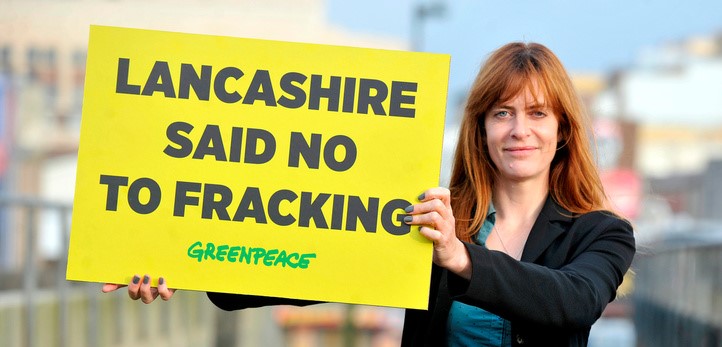
Responding to reports fracking is back on the agenda Greenpeace UK’s head of energy Rosie Rogers said:
“After a decade of hype and bluster, all the fracking industry has given us are two holes in a muddy field and some minor earthquakes. Trying to restart fracking now would only mean wasting more time when we have little. It will take many years to develop and if it ever gets produced, it will be sold to the highest bidder on the international market, with no impact on our energy bills. If the UK and Europe want to end their dependence on Russian gas, the quickest way to do that is by insulating homes, installing heat pumps and boosting renewables. These are tried and tested technologies, quick to deploy and getting cheaper all the time. With the Spring Statement just around the corner, the UK government should work on an emergency plan to free our country from gas dependence. This would protect households from soaring bills, tackle the climate crisis and weaken Putin’s hand.”
ENDS
press.uk@greenpeace.org – 020 7865 8255.
NOTES TO EDITORS
Greenpeace UK has produced the following briefing on the government’s expected Energy Supply Strategy
Energy Supply Strategy briefing:
Urgent action needed on energy demand
Context
- Faced with soaring energy bills, a cost of living crisis and an invasion of Ukraine by Russia – one of the world’s biggest oil and gas suppliers – the UK government is at a pivotal moment.
- Prime Minister Boris Johnson called for countries to cut dependence on Russian oil and gas because it “has given Putin his grip on western politics.”
- Business Secretary Kwasi Kwarteng pledged to get the UK off Russian oil by the end of this year and has launched a review into how to reduce Britain’s exposure to Russian gas imports. Kwarteng has said that renewables will help cut gas dependence.
- Johnson is set to launch a new Energy Supply Strategy and is backing new oil and gas licences and is reportedly looking again at the prospect of fracking.
Rosie Rogers, head of energy at Greenpeace UK, said: “This is Boris Johnson’s moment of abject failure to rise to the challenge. Today the EU announced more renewables and efficiency to cut fossil fuel demand, but Johnson is stuck on the stale old approach of pushing hydrocarbon supplies.”
“New licences will take 28 years to start production, the gas won’t belong to the UK but to the companies who extract it, and it will be sold on global markets at the highest possible price.
“Meanwhile in the short term we’ll keep sending £6m per day to Putin in gas money, while British people’s bills continue to skyrocket.
“This plan is inadequate, wrongheaded and foolish. Johnson – and Sunak alike – seem completely disinterested in tackling energy demand. We need a race for renewables, heat pumps and home insulation to isolate Putin.”
What should be in the Energy Supply Strategy?
Energy demand policies & renewables.
- Despite being obsessed with security of supply, and haunted by the prospect of failing to ‘keep the lights on’, the government consistently ignores energy demand, which would be the most durable way to ensure long-term energy security.
- The UK has almost ground to a halt on insulating homes and commercial buildings, and has the worst heat pump sales record in Europe. Yet Johnson appears to be prioritising a strategy focused on new oil and gas, without upgrading our buildings, which means investment in expensive heat will literally go out the window.
Why is more new gas a bad plan?
- It takes too long. If new gas licences were approved tomorrow, they’d take on average 28 years to get going, according to the Oil and Gas Authority’s own figures.
- It won’t lower gas prices, and won’t help bills. As pointed out by Business Secretary Kwasi Kwarteng, Energy Minister Greg Hands and COP President Alok Sharma, and the government’s own advisors Climate Change Committee.
- We won’t keep the gas, because it’s not ‘our gas’. Fossil fuels aren’t nationalised in the UK, so any newly extracted fossil fuels will belong to the company who produced them, and so they’ll simply be sold to the highest bidder on the global market.
What about fracking?
As the government rightly said: “Fracking causes earthquakes, is hated by local communities, would take 5-10 years to kick-start, and won’t even lower the price. We need to get real: Lancashire isn’t Texas, any shale gas we do find won’t lower the European price, and Cuadrilla aren’t going to sell their gas below market rate, are they?”
New nuclear
- New nuclear power is touted as a solution to our energy problems, but in reality it’s complex, beset by huge delays and hugely expensive to build (often subject to escalating costs).
- Aside from the much-delayed Hinkley Point C reactor which was given the go-ahead in 2016 but will hope to start generating around 2027, the only viable nuclear project is Sizewell C. EDF estimate that if things go well it will be generating by 2034, taking a further 6 years to be carbon neutral.
- This model of a nuclear reactor, the EPR, is well over time and budget wherever it is being constructed in Europe. The only place that managed to get it working – Taishan in China – closed it down in July last year after a few years of operation and it has not yet reopened.
- Nuclear power also creates hazardous waste for which there is no operating solution anywhere. Nor are ‘advanced’ or ‘modular’ reactors necessarily any better and they still suffer from weapons proliferation risks.
What are other countries doing?
- The UK looks set to get left behind once again. Germany has shelved a major gas pipeline and turbocharged its push for renewables, and the EU Commission plans to cut Russian gas by two thirds in a year, with a major emphasis on energy efficiency, heat decarbonisation and renewables.
We need:
- In the Spring Statement we need a £10bn Emergency Energy Package backed by the Business Secretary, the Chancellor, and the Prime Minister to Get Off Gas and stand up to Putin – with a pledge to fund heat pumps, insulation and offer financial support for low-income households during this Parliament.
- Spring into action: roll out home heating upgrades for 7 million homes by 2025. Bring back incentives for solar panels. Require all new homes to have heat pumps and solar panels – starting immediately.
- Recruit 45,000 green homes experts: Train up 25,000 installation engineers and 20,000 energy specialists to upgrade 7m homes by 2025 and secure a just transition for fossil fuel workers.
- Fast-track renewables: Turbo charge onshore wind and solar so they are well over doubled by 2030 making sure all the barriers in place are removed, and ensuring support from and for communities affected. Accelerate the offshore wind project pipeline, ensuring it is delivered in harmony with nature and biodiversity.
- Gear-up the Grid: We need a smart energy grid fit for the 21st century. A grid that shares energy between European countries to make sure we all can cleanly power our economies and has better storage, including clean hydrogen, and flexible demand to securely deal with the shifts in energy production and consumption coming down the line.
